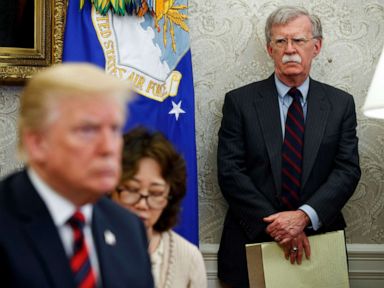
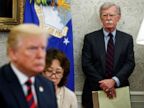

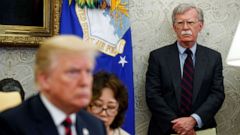
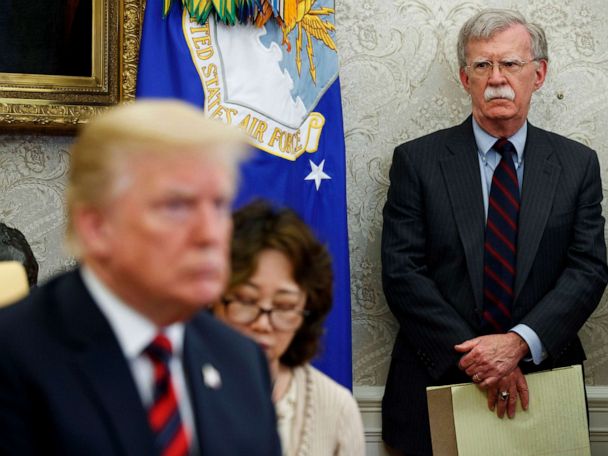
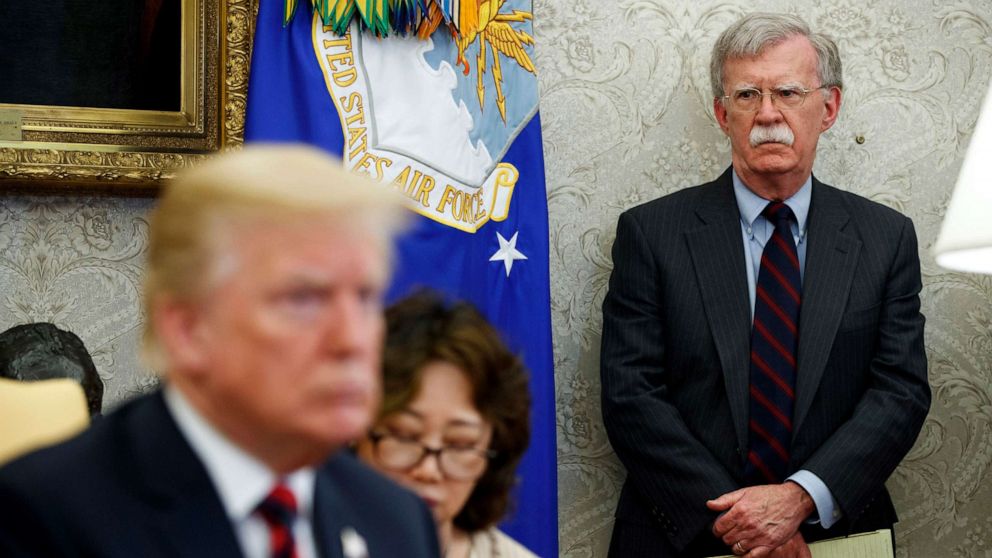
President Donald Trump and John Bolton were always an odd couple.
Lured by the foreign policy hawk’s decades of conservative credentials and frequent appearances on Fox News, Trump praised Bolton before picking him in 2018 as his third national security adviser.
But over the course of his 17-month tenure, Bolton’s advocacy for hard-line policies on North Korea, Iran and other international flashpoints put him on a constant collision course with the president.
In a book due to be published Tuesday, Bolton described a relationship that soured as he came to view Trump as acting solely in his self-interest, such as when, Bolton alleged, Trump asked China’s leader to help him win reelection by purchasing goods from American farm states.
“There really isn’t any guiding principle that I was able to discern other than what’s good for Donald Trump’s reelection,” Bolton told ABC News chief global affairs correspondent Martha Raddatz in an interview airing Sunday night.
Trump has for years expressed an affinity for Bolton, including as he sought the presidency. In late 2015, he called him a “tough cookie” who “knows what he’s talking about.”
After he took office, Trump kept dishing out public praise, in early 2017 calling the former U.S. ambassador to the United Nations “a terrific guy” who “knows a lot.”
For Trump, Bolton brought to the National Security Council decades of conservative foreign policy chops popular with the president’s political base. Bolton, in turn, used the opportunity to push a hard-line agenda on Iran, North Korea and the expansionist use of the U.S. military worldwide.
“He’s highly respected by everybody in this room,” Trump, surrounded by senior military leaders, told reporters on Bolton’s first day in April 2018.
While Trump and Bolton aligned on some policies — such as pulling the United States from certain international treaties and taking Iran to task over its nuclear program — Bolton often pushed to flex U.S. muscle beyond what Trump was willing to stomach.
He often struck a harsher tone than the president, more willing to denounce geopolitical foes like Russia.
For a president who values personal relationships with autocratic rulers, Bolton sometimes came to play the role of a “bad cop” – talking tough with leaders while Trump tried his hand at working out a deal.
“The only thing I liked about Bolton was that everybody thought he was crazy,” Trump told The Wall Street Journal in an interview Wednesday. “And frankly, when you walk into the room with him, you’re in a good negotiating position. Because they figure you’re going to war if John Bolton was there. He wanted to go to war with everybody.”
In April 2018, Bolton said in an interview with CBS News that the United States was “looking at” the “Libya model” for North Korea, igniting a diplomatic crisis when the North — and many in Washington — interpreted the comment as meaning the Trump administration wanted to put it on a path to regime change.
When details of Bolton’s book began leaking in January — and were shared again last week — Trump called the remark a foolish mistake. Bolton, though, wrote in his book that Trump had at the time not been particularly upset and even praised his performance on CBS; he said the reference to Libya meant sanctions against North Korea would be lifted only when it completely ended its nuclear program.
While their continuing disconnect was clear, Bolton did frequently advocate for Trump in public — at times lauding his approach to adversaries. Discussing China in October 2018, he told the conservative radio talk show host Hugh Hewitt that “they’ve never seen an American president this tough before.”
Beyond his neoconservative views and his support for the Iraq War, another aspect of Bolton’s public persona — his trademark bushy mustache — drew Trump’s attention, according to several accounts.
Trump’s aides said the president viewed Bolton’s facial hair as a negative — to the degree it may have affected when or for what role Trump hired him, according to The Washington Post, The Associated Press and Trump’s biographer, Michael Wolff.
But Bolton wrote in his book that Trump told him his mustache “was never a factor.”
“I don’t really believe my looks played a role in Trump’s thinking,” Bolton wrote. “And if they did, God help the country.”
Bolton ultimately spent 17 months on the job, leaving the White House in September 2019 after Trump decided to host Taliban leaders at Camp David — a gathering Bolton opposed and which ultimately never happened. His resistance mirrored his increasing agitation over Trump’s overtures to — and desire for talks with — the leaders of Iran and North Korea.
Months earlier, Bolton had skipped Trump’s second summit with North Korean leader Kim Jong Un — taking an unrelated trip to Mongolia instead and in the process sending a glaring signal to the president.
While Bolton maintains he had offered his resignation to the president, Trump said he had forced out his adviser.
Months after he left the White House, in December, Bolton waded into critical territory as he hit his former boss for pursuing a policy on North Korea’s nuclear weapon program that he described as “more rhetorical than a real policy.”
In his forthcoming book, he was highly critical of Trump’s last-minute decision not to strike Iran in January following a series of provocative moves the U.S. attributed to Iran, including shooting down a drone.
“In my government experience, this was the most irrational thing I ever witnessed any President do,” he wrote, according to an advance copy of the book obtained by ABC News.
But for a time, Trump kept up his praise even after Bolton bolted — particularly as his former adviser’s name was raised as a possible witness in last fall’s congressional impeachment inquiry against the president.
“I like John Bolton,” Trump said in November 2019. “I always got along with him.”
Weeks later, he tweeted, “John Bolton is a patriot.”
Bolton ultimately refused to voluntarily testify before the House’s impeachment inquiry, later offering instead to speak before the Senate if subpoenaed. But the Republican-controlled body declined to hear from witnesses in the president’s impeachment trial, and Bolton instead focused on a book about his time working under Trump.
The White House has sought to block publication of the book, “The Room Where It Happened: A White House Memoir,” which is set for release Tuesday. After the U.S. Department of Justice asked a court to halt its release, a federal judge ruled Saturday publication could proceed but noted Bolton’s conduct in releasing the book “raises grave national security concerns.”
The Justice Department has argued Bolton had yet to complete a pre-clearance process he had agreed to upon becoming national security adviser.
Trump has lashed out, calling the book “a compilation of lies and made up stories, all intended to make me look bad.” He first went after Bolton in January when some details of the book leaked to the press.
“Many of the ridiculous statements he attributes to me were never made, pure fiction,” Trump wrote in a tweet Thursday. “Just trying to get even for firing him like the sick puppy he is!”
He wrote Bolton was a “wacko” who “said all good about me, in print, until the day I fired him.”
“A disgruntled boring fool who only wanted to go to war,” Trump tweeted. “Never had a clue, was ostracized & happily dumped. What a dope!”
Bolton said he did not believe the book contained classified information and that he had already participated in the clearance process to the degree he believed was required. In comments made to ABC News Thursday, he called Trump’s attack “unbecoming of the office of president.”
“The president isn’t worried about foreign governments reading this book,” Bolton said. “He’s worried about the American people reading this book.”
Tune into “The Room Where It Happened: ABC News Exclusive Interview with John Bolton” –- The ABC News primetime special airs 9–10 p.m. ET, Sunday, June 21.
ABC News’ Conor Finnegan contributed to this report.

